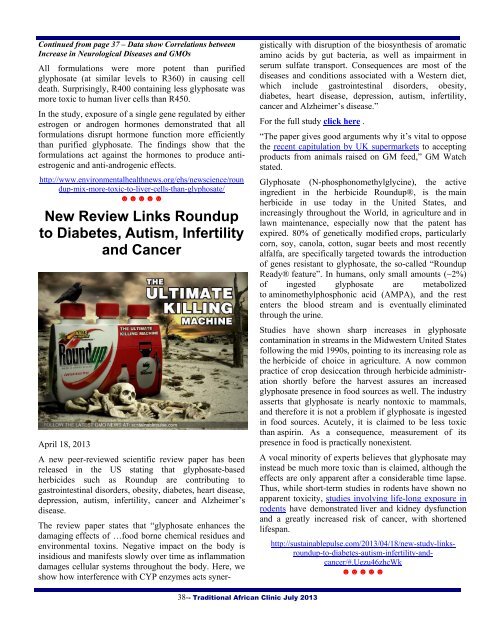toxicity - pesticides, herbicides and insecticides - Blackherbals.com
toxicity - pesticides, herbicides and insecticides - Blackherbals.com
toxicity - pesticides, herbicides and insecticides - Blackherbals.com
You also want an ePaper? Increase the reach of your titles
YUMPU automatically turns print PDFs into web optimized ePapers that Google loves.
Continued from page 37 – Data show Correlations betweenIncrease in Neurological Diseases <strong>and</strong> GMOsAll formulations were more potent than purifiedglyphosate (at similar levels to R360) in causing celldeath. Surprisingly, R400 containing less glyphosate wasmore toxic to human liver cells than R450.In the study, exposure of a single gene regulated by eitherestrogen or <strong>and</strong>rogen hormones demonstrated that allformulations disrupt hormone function more efficientlythan purified glyphosate. The findings show that theformulations act against the hormones to produce antiestrogenic<strong>and</strong> anti-<strong>and</strong>rogenic effects.http://www.environmentalhealthnews.org/ehs/newscience/roundup-mix-more-toxic-to-liver-cells-than-glyphosate/☻☻☻☻☻New Review Links Roundupto Diabetes, Autism, Infertility<strong>and</strong> CancerApril 18, 2013A new peer-reviewed scientific review paper has beenreleased in the US stating that glyphosate-based<strong>herbicides</strong> such as Roundup are contributing togastrointestinal disorders, obesity, diabetes, heart disease,depression, autism, infertility, cancer <strong>and</strong> Alzheimer’sdisease.The review paper states that “glyphosate enhances thedamaging effects of …food borne chemical residues <strong>and</strong>environmental toxins. Negative impact on the body isinsidious <strong>and</strong> manifests slowly over time as inflammationdamages cellular systems throughout the body. Here, weshow how interference with CYP enzymes acts syner-gistically with disruption of the biosynthesis of aromaticamino acids by gut bacteria, as well as impairment inserum sulfate transport. Consequences are most of thediseases <strong>and</strong> conditions associated with a Western diet,which include gastrointestinal disorders, obesity,diabetes, heart disease, depression, autism, infertility,cancer <strong>and</strong> Alzheimer’s disease.”For the full study click here .“The paper gives good arguments why it’s vital to opposethe recent capitulation by UK supermarkets to acceptingproducts from animals raised on GM feed,” GM Watchstated.Glyphosate (N-phosphonomethylglycine), the activeingredient in the herbicide Roundup®, is the mainherbicide in use today in the United States, <strong>and</strong>increasingly throughout the World, in agriculture <strong>and</strong> inlawn maintenance, especially now that the patent hasexpired. 80% of genetically modified crops, particularlycorn, soy, canola, cotton, sugar beets <strong>and</strong> most recentlyalfalfa, are specifically targeted towards the introductionof genes resistant to glyphosate, the so-called “RoundupReady® feature”. In humans, only small amounts (~2%)of ingested glyphosate are metabolizedto aminomethylphosphonic acid (AMPA), <strong>and</strong> the restenters the blood stream <strong>and</strong> is eventually eliminatedthrough the urine.Studies have shown sharp increases in glyphosatecontamination in streams in the Midwestern United Statesfollowing the mid 1990s, pointing to its increasing role asthe herbicide of choice in agriculture. A now <strong>com</strong>monpractice of crop desiccation through herbicide administrationshortly before the harvest assures an increasedglyphosate presence in food sources as well. The industryasserts that glyphosate is nearly nontoxic to mammals,<strong>and</strong> therefore it is not a problem if glyphosate is ingestedin food sources. Acutely, it is claimed to be less toxicthan aspirin. As a consequence, measurement of itspresence in food is practically nonexistent.A vocal minority of experts believes that glyphosate mayinstead be much more toxic than is claimed, although theeffects are only apparent after a considerable time lapse.Thus, while short-term studies in rodents have shown noapparent <strong>toxicity</strong>, studies involving life-long exposure inrodents have demonstrated liver <strong>and</strong> kidney dysfunction<strong>and</strong> a greatly increased risk of cancer, with shortenedlifespan.http://sustainablepulse.<strong>com</strong>/2013/04/18/new-study-linksroundup-to-diabetes-autism-infertility-<strong>and</strong>cancer/#.Uezu46zhcWk☻☻☻☻☻38-- Traditional African Clinic July 2013
















